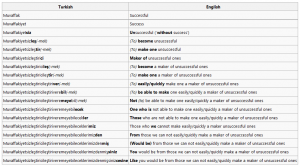Turkish verbosity
Many English speakers who enjoy long words will have heard of the 45-letter word pneumonoultramicroscopicsilicovolcanoconiosis. The word did not come about organically, however: it was invented in 1935 by Everett M. Smith, president of the National Puzzler’s League, to serve as the longest word in English. It is primarily made up of common Latin and Greek prefixes and suffixes, and means “a lung disease caused by inhaling very small particles of silica dust”. The rather easier to remember 28-letter antidisestablishmentarianism is also a classic choice for fans of long words – meaning “against the disestablishment of the church”.
However, many languages, such as German, Hungarian and Turkish, are very agglutinative: that is to say, longer words are formed by adding shorter words on to enhance their meaning. Here’s an example, taken from Wikipedia (click for the full sized version):
It is actually possible in Turkish to continue adding suffixes to words infinitely, creating an endless word that makes grammatical sense. However, if the same suffix is repeated too many times, the word becomes nonsense.
So, the longest word in Turkish is generally accepted to be muvaffakiyetsizleştiricileştiriveremeyebileceklerimizdenmişsinizcesine, which (like pneumonoultramicroscopicsilicovolcanoconiosis above) mostly comprises a variety of different suffixes and prefixes. The word comes to mean “as if you were one of those people we could not easily turn into a maker of unsuccessful ones”. This word isn’t likely to come up in conversation any time soon, but the point is that it’s grammatically sound, and could easily be understood by a native Turkish speaker.

